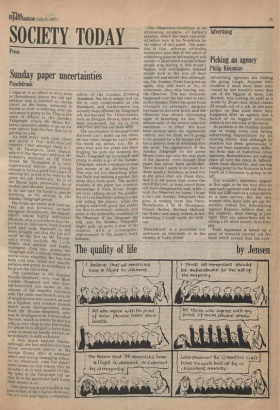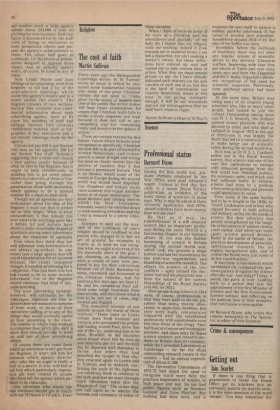Advertising
Picking an agency
Philip Kleinman
Advertising agencies are finding the going tough. Anyone who doubted it must have been convinced by last month's news that . one of the biggest of them, Leo Burnett, was cutting its staff at a stroke by 20 per cent, which means 53 people out of a job. In the past purges on that scale have only happened after an agency lost a bunch of its biggest accounts, which is not the case at Burnetts.
Its problem is the familiar double one of rising costs and falling advertising expenditure by its existing clients. And although its reaction has been spectacular, it has not been basically very different from that of numerous other agencies. Redundancies are taking. place all over the place in Adland, albeit more discreetly, and the big talking point in the business is how, much of a business is going to be left.
This wouldn't, therefore, appear at first sight to be the best time to approach agencies and ask them to fork out E200 each as a subscription to a newservice. But the two women who have just set up the service, called the Advertising Agency Register, believe that, on the contrary, their timing is just right. They say subscribers will be saving a lot more money than they pay.
Their argument is based on a piece of research carried out for them which reveals that the aver
age medium-sized or large agency spends about £24,000 a year on pitching for new business. Half that figure is accounted for by the staff costs of laying on executives to meet prospective clients and present the agency's achievements to them. The other half goes in overheads, i.e. the physical preparations designed to impress those clients. And an unlucky agency won't, of course, be hired by any of them.
Now Lyndy Payne and Joan Millington are proposing, with their Register, to cut out a lot of the unproductive meetings which waste the agency's money and to a lesser extent the client's. The Register consists of two sections. Section One contains non-confidential information about each subscribing agency, such as its client list, numbers of staff and billings. Section Two contains confidential material such as biographies of key executives and a ten-minute videotape made by the agency. Clients will pay £25 to get Section One data on ten agencies, £50 for the Sectioh Two stuff. Nobody's suggesting that a client will choose a new agency purely because of what he sees in the Register, but it ought to help considerably in enabling him to get down immediately to a shortlist of three or four rather than going through the presentation ritual with seventeen, which appears to be a normal number for a client to start with.
Though not all agencies are very
. enthusiastic about the idea of the Register, I must say that it strikes
• me as very bright. What is most extraordinary is that nobody has ever tried to do anything quite like it before, for past surveys have shown a quite remarkable degree of ignorance among many advertisers about the character of agencies.
Even when they think they are well informed their information is not always up-to-date. In one recent case a large agency was left out of consideration for an account because the client company thought it handled advertising for a competitor. That had been true but had ceased to be so some months beforehand. Use of the Register should eliminate that kind of misunderstanding. The most interesting material, however, will certainly be the videotapes. Agencies are free to devote their ten minutes to samples of their work, to shots of their executives talking or to any of the things they would normally spend an hour presenting to the client. The manner in which they manage to compress their pitch into such a short time should provide in itself an acid test of their advertising ability. Of course there are some facts which an advertiser won't get from the Register. It won't tell him for instance which, agency director who talks like an angel is really a fool or a knave. It may well fail to tell him which particularly impres
sive ads were created by people who have left the agency which put ;diem in its videotape.
:Any advertiser who wants the real lowdown should get in touch with me. If! know it I'll tell it. Free!



































 Previous page
Previous page